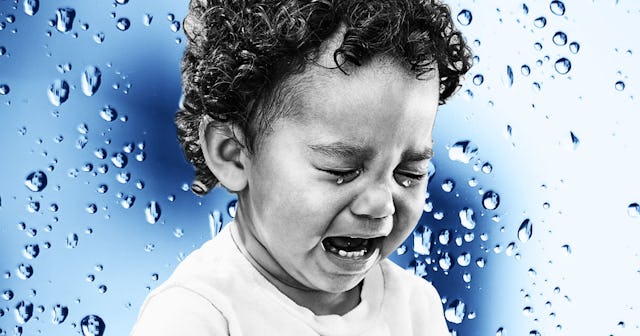Why I Stopped Telling My Kids To 'Stop Crying!' (Even When I Want To)

Has anyone ever told you to “stop crying” when you were very upset about something? How did that make you feel? Did it make you less upset? Were you literally able to stop crying immediately? I highly doubt it.
You didn’t feel heard, and you felt that you needed to stop crying in order to not be labeled as “too emotional” about whatever you truly cared about — enough to cause you to cry in the first place.
Imagine when a child hears those words from their parents? During my parenting journey, the phrase “stop crying” has come out more times than I wish to admit. As a mom, I get it; sometimes you’re tired of the whining, the tears, and the constant complaining. There are days when I just want to run away and hide until bedtime. However, it’s important to understand what is causing the crying and let our children express their feelings.
Let’s stop telling our children to stop crying and allow them to express their emotions openly without being reprimanded. It might not seem like a big deal to us, but to them, it’s a very big deal. And to brush that off with a directive to “stop crying” is to dismiss the things they feel are important. In fact, saying ‘stop crying!’ is likely to just make them cry harder, get more stressed out, and totally backfire.
Crying is actually very beneficial for people. Research has found that crying:
– Has a soothing effect. When people cry they regulate their own emotions and calm themselves.
– Helps get support from others. Crying lets people know we’re vulnerable and rallies support from those around us.
– Helps to relieve pain. Crying releases oxytocin and endorphins; therefore, crying can help reduce pain and promote a sense of well-being.
– Releases toxins and relieves stress. When humans cry in response to stress, their tears contain stress hormones, and crying may help relieve the body of these hormones.
Jordan Whitt/Unsplash
I have noticed that I feel so much better after crying. I notice that as well with my kids. As soon as they are done crying and letting out those big feelings, they seem much more relaxed and happy.
In one of my many sleepless nights as a first time mom with a newborn, I focused a lot on research about crying in children. I quickly learned that there were many benefits to crying and it really changed the way I approached my kids when they cried and let their emotions out. As much as I want to respond to them with “stop crying” because I’m frustrated and annoyed, I have come to realize that it just means something is not okay in their world, and crying is their way of releasing those emotions to get some relief.
Knowing the research and seeing the positive outcome of allowing my child to cry freely when they felt unhappy versus telling them to stop, I knew it was making a big difference. Not only was I allowing them to feel their feelings without judgement and have them feel heard, I was also helping them release the oxytocin and endorphins that caused those big emotions to begin with.
I knew that, in our family, we had to embrace all of our emotions and really welcome letting our feelings out in our home. In addition, we really started focusing on allowing the kids to see my husband and me cry and/or share our own feelings openly and support one another. There are times where my daughter will come to me and say “I really feel sad that my brother hit me earlier and I just want to cry for a minute. I’ll need a hug from you after.” Or “It’s okay to cry mom, I know it’s difficult.”
It makes me feel really good as a mom that she feels comfortable enough to tell me how she feels, supports the expression of emotions of herself and others, and understands that there is no judgement for expressing your feelings in our home. I often hear her tell her baby brother, “Just let those feelings out and I’ll give you a big hug when you’re done.”
I’m responsible for raising the future and I want to break the stigma behind crying and expressing your emotions. Boy, girls, men and women should be able to cry without judgement. By teaching our children that letting our emotions out is completely normal and a healthy way to express ourselves, we are paving the way to normalize these things, so that our children don’t feel the need to repress their feelings at the expense of their mental and emotional health.
Let’s get to a point where we no longer label children and adults as “too emotional” or “too much to handle” when they want to cry. Let’s absolutely stop stigmatizing men and boys who feel comfortable expressing their emotions. Let’s start with breaking the stigma of crying at home, allowing our children to cry and express their emotions, and making “stop crying” a thing we used to say.
This article was originally published on